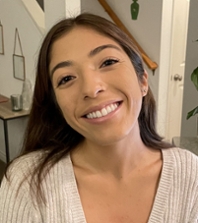
Fatima Maciel
Political Science/Public Policy and Ethnic Studies :: Bebe & Marvin Zigman Scholar

- Profile
Profile
When Fatima was in elementary school, she learned firsthand what it meant to be an undocumented immigrant. The media and politicians exploited the narrative of her situation and cast her as “a leech who managed to hack the system and take resources from ‘real citizens’.” As a result, she became ashamed of her heritage and status in the United States to the point that she would identify as white and deny her Mexican background. Today, after time and self-reflection, Fatima realizes the importance of staying true to her roots. “My parents’ journey and selfless actions formed me into an independent and determined individual who aspires to make her parents’ journey worth leaving everything behind.”
As a Political Science/Public Policy and Ethnic Studies dual major at Eleanor Roosevelt College, Fatima’s goal is to work in the public government sector as an elected official, after attaining a graduate degree in Public Policy with an emphasis on the study of social justice. “The social inequalities in our society have driven me to work in hopes of expanding my contributions to my community and helping the fight against policies that underserve and underrepresent minorities. I strive to be a strong leader who produces equitable and just policies that serve all, not just one.”
The Raza Resource Centro helped Fatima find “her” community on campus and realize that as a student she could design and conduct research on her own. As a Learning Specialist at the Raza Resource Centro, she has a goal of increasing Latinx participation in university-funded research. She wants people to know that Latinx/a are producers of knowledge through their unique lived experiences. Fatima believes that “there is power in knowledge; and when Latinx/a students engage in research and bring these unique perspectives into these heavily dominated white spaces in a way we reclaim our power. Our research gives people an opportunity to see our world through an intersectional lens.”
